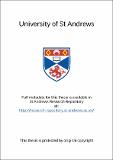Patterns of coping behaviour in depression
Date
1984Metadata
Show full item recordAbstract
Previous literature relating the occurrence of stressful life events to the onset of depression is reviewed together with that which discusses the range of behaviour which people habitually deploy against such depression. The study explored the proposition that certain personality characteristics would influence the pattern of behaviour shown by individuals responding to stressful situations and would therefore determine their susceptibility to reactive depression.
24 subjects, from each of three experimental groups (normals, psychiatric controls and depressives) were asked to describe their responses to a series of 6 imagined stressful events and to the condition of feeling depressed itself. It was hypothesised that internal subjects (as defined by the Rotter Internal-External Locus of Control scale) would deploy more active problem-solving behaviour than externals who were predicted to show more defensive or passive behaviour. It was also hypothesised that the trait of internality would be stable and predictive of susceptibility to depression.
Although the predicted relationship was observed between locus of control beliefs and both patterns of responding and the amount of depressed mood, it was concluded that the external beliefs could be regarded as being co-determined with the depressive affect, rather than preceding and causing it. Some evidence was found for interactions between the nature of the stressful event and the nature of the individual, as determinants of the patterns of responding elicited. The nature of such interactions was discussed in the light of current theories of depression.
Type
Thesis, MSc Master of Science
Collections
Items in the St Andrews Research Repository are protected by copyright, with all rights reserved, unless otherwise indicated.

